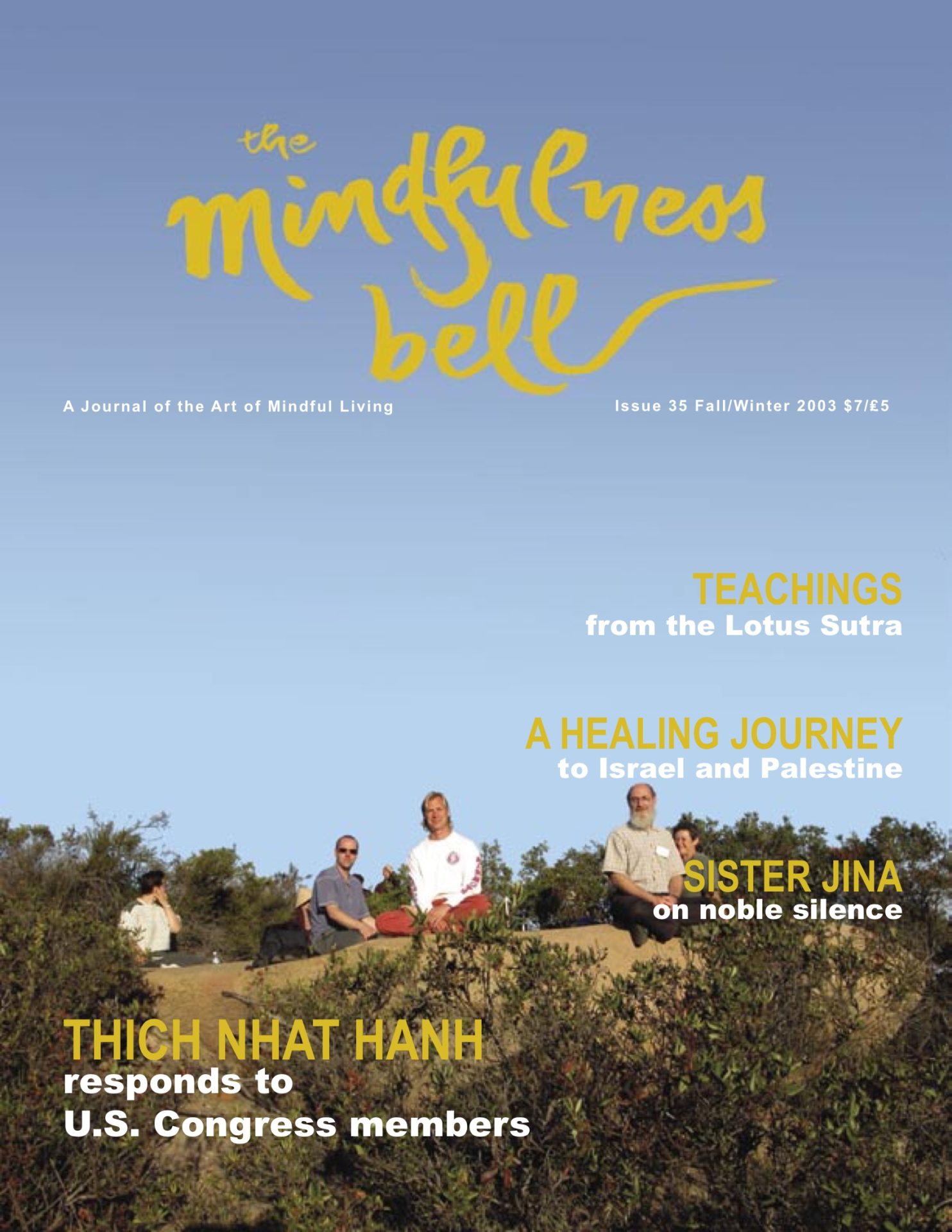
By Scott Nance
The next time a congressman or congresswoman is waiting at the airport, maybe he or she won’t be caught up thinking about his or her next meeting, or an upcoming vote on the floor of the U.S. House of Representatives. Instead, he or she may be doing mindful breathing or mindful walking. That’s because Thay, Sister Chan Khong, and other monastics from Plum Village recently brought the importance of mindfulness and going home to ourselves to members of Congress at an evening presentation at the Library of Congress on September 10th.

By Scott Nance
The next time a congressman or congresswoman is waiting at the airport, maybe he or she won’t be caught up thinking about his or her next meeting, or an upcoming vote on the floor of the U.S. House of Representatives. Instead, he or she may be doing mindful breathing or mindful walking. That’s because Thay, Sister Chan Khong, and other monastics from Plum Village recently brought the importance of mindfulness and going home to ourselves to members of Congress at an evening presentation at the Library of Congress on September 10th. A special retreat for members of Congress and their families followed two days later.
The idea behind meeting with members of Congress, their families, and their staffs was not to offer political ideas or suggestions, Thay said a few days before the retreat.
Co-sponsored by The Faith and Politics Institute, an independent organization in Washington, the purpose of the events was to share the practice of mindful breathing and mindful walking with U.S. lawmakers, their staffs, and their loved ones.
It’s been forty years since Thay first visited the U.S. capital. He first came in 1963 when the South Vietnamese regime repressed Buddhists and kept them from celebrating the Buddha’s birthday. Thay noted that he visited Washington a lot during the Vietnam War. “I came to bring information about the Vietnam War; information that was not available through the warring parties,” he said.
Thay recalled a particularly memorable visit during the war when he met with six senators, including Senators Edward Kennedy and George McGovern. “Six senators were eating lunch and asked me questions. I did not have the time to eat one spoonful of soup,” he remembered.
For this most recent trip, Thay and Sister Chan Khong began their visit by meeting with reporters. The press conference was the morning of September 10, just hours before Thay’s talk in a packed auditorium at the Library of Congress. “We have come as a group of people who know the practice,” Thay said. “That is why in the retreat, there will be a collective energy of mindfulness that can support those who are beginners in the practice.”
Congressman Brian Baird of Washington has been reading Thay’s books for more than ten years, and gained a lot from participating in the retreat. “I thought it was outstanding,” the congressman said following the retreat. “It was a privilege and honor to meet Thich Nhat Hanh. I thought many of his ideas--particularly the practice of meditation as he teaches it--can be very beneficial. “Both my wife and I have tried to incorporate the practice of meditation--especially walking meditation concepts--and mindfulness in general in our daily lives,” he added. Congressman Baird said he and his wife find themselves eating differently after the retreat. He also practices walking meditation at work. “When walking to and from votes, for example, I’ll use that opportunity to be aware of breathing, and think of some of the concepts that Thich Nhat Hanh shared with us,” he said.

Participating in the retreat has already had a positive effect on his job in the House, the congressman said. “I think it tends to make it both more effective and more enjoyable,” he said. The congressman believes he will be more effective by being focused on core values and awareness, then interactions with others will be more positive and more successful. “And much of this job is about interactions,” he said.
Introducing Thay for the evening talk, Congresswoman Lois Capps of California acknowledged that Thay’s talk coincided with the observance of the September 11 terrorist attacks against the World Trade Center in New York and the Pentagon.
Congresswoman Capps said that “it is very appropriate that he be here with us, particularly that he be here on this eve of this momentous day in our nation’s history…”
To begin the evening at the Library of Congress, Sister Chan Khong sang a beautiful song, encouraging the audience to breathe mindfully in preparation for Thay’s talk. By surprise, another of the notables who made introductory remarks for Thay was well-known television comedian Garry Shandling. Mr. Shandling followed Sister Chan Khong, and he asked the audience for a round of applause for her lovely, inspirational song. The audience responded with a rousing ovation. “Sister Chan Khong, along with all of us who are fighting our egos, still wants a little applause now and then,” Mr. Shandling said playfully. “She is a fantastic woman.”
Then, with a smile, he said, “The question that must be in your mind: What am I doing here?” He revealed that he has practiced Zen Buddhism for twenty-five years. “I never talk about it,” he said. “My comedy certainly deals with the human condition and the suffering, and the pain, and the emotions that we all live through. Thank goodness I have a way to express it through my comedy. Behind that, I am someone who has meditated, and had a path--and a serious path--all these years.”
“The magic of Thich Nhat Hanh--and it’s nothing short of magic--is that he invited me, knowing that this sense of humor---this child-like art---is really part of life,” he added. Mr. Shandling said he has known Thay for two years. “I love him. I know him after those two years. I knew him after the first moment I looked in his eyes,” he said. He said that Thay really has touched in such a gentle, special way so many countless numbers of lives. “I’m one of them, and that’s what brings me here tonight,” he said.
Scott Nance is a professional journalist living and practicing in the Washington, D.C. area. Photography by Eric Alan.

